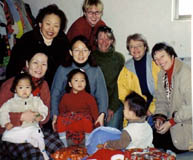 A day in the life of an expatriate wife may seem glamorous and alluring _ a chance to see a new culture and endless holidays. But, in reality, many are faced with loneliness and isolation.
A day in the life of an expatriate wife may seem glamorous and alluring _ a chance to see a new culture and endless holidays. But, in reality, many are faced with loneliness and isolation.
In Busan, a group of international women have built a support network to overcome some of the difficulties of living in a foreign land. The Busan International Women's Association (BIWA) has two main goals: friendship and charity.
BIWA is a way to find people with similar interests and share experiences to make life easier, not only for oneself and one's friends, but also for Busan's needy.
BIWA President Elaine Maloney, agreed to take a leadership role because she believes in the importance of maintaining an international women's network.
Maloney, an American who moves to a different country every two or three years, said participation in an international women's group has been a priority for her wherever she has lived. She signed up to be the special activities coordinator at BIWA while in the process of moving here from Turkey.
“What better way of exploring and learning the culture?” she said with a smile.
By offering many activities including tennis, yoga, cooking, hiking, language lessons and a book club, BIWA has options to suit all interest groups.
There are also several ways people can volunteer to help charitable organizations, Maloney said, adding that it can be a rewarding experience while living in a foreign country.
The BIWA welfare group works hard helping the less fortunate with the women involved often finding themselves in a tough position. This is especially true when facing the reality of the hardships endured by orphans and the underprivileged.
But Dawn Harris, a welfare group member, says the work is satisfying because of the warm response they get.
“Everywhere you looked there were hugs and smiles,” she said, describing a recent visit by the group to an orphanage. “It was a wonderful time, the best of which was when a little boy in my arms looked me in the eyes and giggled.”
BIWA has been operating since 1965 and now has 165 members of 20 nationalities. It has come a long way since its early days when there were only 30 women from a handful of countries.
Originally, membership comprised the wife of the mayor of Busan, the wife of the governor of South Gyeongsang Province, prominent members of the local Korean community, wives of the commander and officers of U.S. army base Hialeah, and other expatriate women living in the area.
Marlies Glieden has been president four times since her first stint in 1997. Glieden has seen many changes in the group and society of Republic of Korea in her 11 years living here.
“When I came here there was nearly nothing written in English, no street signs and no description on food items,” she said. “You needed a Korean to help when you went shopping.”
“The coffee shops were at these times in the basement of houses, and were very dark, but somehow seemed adventurous _ no comparison with today's clean and comfortable coffee shops.”
However, the German expat said while Republic of Korea is now much more accommodating of foreigners, BIWA remains essential in providing a support network for expatriate women.
BIWA has grown stronger and larger as more expatriates have located to Busan. Membership is open to any woman who resides in Busan or the Gyeongsangnam-do area.
BIWA members believe the association is a great asset to the foreign and Korean communities and the women all agree that the presence of a charitable, social and cultural organization makes relocating to Busan much easier.
“I'd have to say that being accepted and loved by close BIWA lady friends has been my best experience so far while living here in Busan,” Maloney said.
For more information, visit BIWA online at www.geocities.com/biwa_dove/index.html.
 A day in the life of an expatriate wife may seem glamorous and alluring _ a chance to see a new culture and endless holidays. But, in reality, many are faced with loneliness and isolation.
A day in the life of an expatriate wife may seem glamorous and alluring _ a chance to see a new culture and endless holidays. But, in reality, many are faced with loneliness and isolation. 